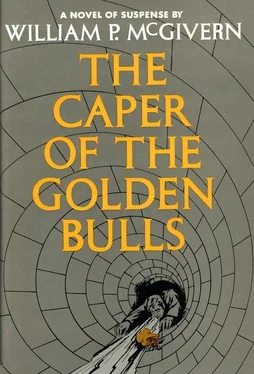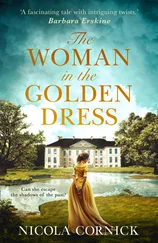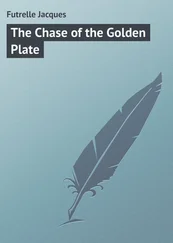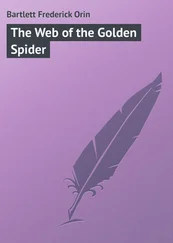Twelve feet below Peter on the sidewalk in front of the bank was a detail of six policemen. Since the beginning of the fiesta, there was no minute of the day or night when the doors of the bank were left unguarded; a round-the-clock security was maintained by severe, alert officers with holstered automatics in their belts, and whistles hanging on short chains from the epaulets of their tunics.
This was an area of the operation Peter had never been satisfied with, although he knew from observation that at this time of the morning the sunlight on the panes of glass silvered them like mirrors. In addition, the heavy squares of iron grille work on the windows would provide a shield for what he must do now; but he was still gambling recklessly on the strength of all the slender threads of chance. The fly buzzing about a policeman’s ear, or the sudden crick in the neck, that could cause a man to turn suddenly and look directly up at the window Peter was working on.
Peter drew a deep breath, and held half of it, steadying himself as he would if he were about to squeeze off a shot on a target range. Then he opened the tool kit and picked up his glass cutter. He moved the shade, slipped his hand behind it, and made a swift, precise incision on the bottom of a pane of glass. After waiting a full minute, he covered the cut with transparent tape. One of the policemen looked along the street, his eyes roving about alertly. Peter let the shade swing gently back into place, an instant before the policeman turned and glanced up at the windows of the bank. This Peter didn’t like; there was literally no defence against intuition. He knew the man hadn’t heard or seen anything to rouse his suspicions. But nevertheless, his hackles were up.
Peter waited several minutes before peering out again, and then he cursed softly, for he had almost missed an opportunity to finish the job in complete safety. An old man, who was obviously drunk, had fallen in the gutter, and several of the policemen were assisting him to his feet, while the others watched their efforts with indulgent smiles. But even so, Peter was able to make two more incisions, along the sides of the pane, before the policemen returned to their posts in front of the bank. He was forced to wait fifteen more minutes before making the last cut at the top of the glass. In the middle of the pane he pasted an inch-long strip of tape, with one half of it sticking up in the air. This would serve as a door handle; when he pulled on it the pane would fall backward into his hand, hinged by the transparent tape along the bottom edge of the glass.
Peter closed his tool kit and stood perfectly still for a moment. Then he looked at his hands. They had not quite stopped trembling.
The Irishman drilled four holes around the combination knob, lining them up at the cardinal compass points. Into these he inserted spring clamps which locked the diamond cutter-bar tightly against the surface of the vault door. Bendell screwed a short steel handle into the outer ring of the cutting rig.
“What’s the time, Peter?” the Irishman said sharply. He had removed his jacket, and the back of his shirt was dark with perspiration. A tangle of thick black hair fell over his forehead. “Forty-eight minutes,” Peter said. He was studying the notes he had copied from documents in the Museum of Archives, analysing certain measurements in relationship to the swinging needle of the compass he held in his hand.
“The emergency system’s had it,” the Irishman said. “But, lad, it’s still a horse race.”
Strain lined all their faces. Tension had seemingly charged and compressed the air; it was as if they were working under a bell, squeezed and cramped together, isolated from the world. There was a dry smell of dust, and steel shavings, and old documents around them, and another scent, acrid and sweet as jasmine, which told Peter that sweat was popping out all over Francois’s body, coarsening the fragrance of his cologne.
Peter looked steadily at Bendell and the Irishman. “We’re going to come through, lads. Trust me.” He infused them with his own hard confidence, which was more glandular than realistic, for he believed they would come through, not because it was possible, but simply because they must. The Irishman drew a deep breath, gripped the handle on the rim of the cutter-bar, and threw his weight against it... Peter went swiftly through the dark basement of the bank, following the slender beam of his flashlight. He checked his compass, followed a wall to its intersection with another, and then dropped to his knees beside a manhole cover that was secured by a screw lock with a ten-inch bar running through it. He spun the bar until the clamps came loose, raised the manhole lid and climbed down an iron ladder into the storm drains that twisted under the bank towards the river.
Something ran between his feet, claws ticking on slimy stones. Peter flicked his light about and the long slender beam leaped along the drain, flashing on drops of moisture beading the curving walls, brightening the dark rivulet of water running through the trough in the floor of the tunnel. The air was oppressively damp and cold, fetid with the smell of moss and sunless earth. In the springtime, he knew from what he read at the museum, the drains were deep with swiftly running water from the melting snows in the foothills of the Pyrenees.
Now they were almost dry; the trickle in the bottom of the drain was hardly enough to dampen the old stones.
Peter followed the drain for perhaps a hundred yards, occasionally stopping to check his notes and compass. Within another fifty yards, the drain began to narrow; his head scraped against the rounded ceiling, and he went on at an awkward crouch, the beam of his torch describing an ever smaller arc between the compressing walls. At last he was forced to get on his knees and crawl, tucking the flashlight under his belt. After a dozen more yards the tunnel angled sharply right, and ran down to connect with another main drain. Light gleamed at the end of the tube which linked the two mains.
Peter flattened himself on his stomach and wormed his way down the connecting link for several yards, to make absolutely certain it was possible. He was wider in the shoulders than the Irishman and Francois, and he knew they could make it to the next main without any great difficulty.
The force of gravity was in his favour going down the slanting tube.
But it worked against him when he tried to back out; pushing himself uphill turned out to be nearly impossible, for the confines of the link prevented him from getting a reliable leverage with his hands and feet.
And there were cracks and ridges in the old stones which painfully scratched his knees and elbows, and impeded his progress, such as it was, by snagging his belt buckle, his flashlight, the buttons on his coat.
For a bleak moment he thought he might not make it. But he got out at last, and when he was free once more, his breath came harshly and raggedly, the sound grating against the damp walls. He had no love of stifling enclosures, and no affection at all for the creatures who had shared the tunnel with him, gaunt sewer rats whose claws made liquid, scratching noises on the slimy stones, and whose eyes were red and bold in the gloom beyond the range of his flashlight.
Peter backed out of the tunnel, stood when it widened, and ran along the drain to the ladder that led up to the basement of the bank. Time was now the destroyer; and the ticking of his watch seemed as fateful and ominous as the ticking of a bomb... The muscles in the Irishman’s arms stood out rigidly. He was breathing hard, grunting as he turned the cutter-bar a fraction of an inch at a time, grinding fine diamond teeth deep into the steel of the vault. Bendell stood beside him, an appraising frown on his plump face.
Читать дальше












